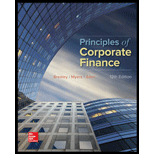
Principles of Corporate Finance (Mcgraw-hill/Irwin Series in Finance, Insurance, and Real Estate)
12th Edition
ISBN: 9781259144387
Author: Richard A Brealey, Stewart C Myers, Franklin Allen
Publisher: McGraw-Hill Education
expand_more
expand_more
format_list_bulleted
Question
Chapter 17, Problem 8PS
Summary Introduction
To determine: The new
Cost of equity is the
Weighted average cost of capital is the appropriate rate at which the firm has to pay to all its security holders to finance its assets.
Expert Solution & Answer
Want to see the full answer?
Check out a sample textbook solution
Students have asked these similar questions
Ned's Co. has an average collection period of 45 days and an operating cycle of 130 days. It has a policy of keeping at least $10 on hand as a minimum cash balance, and has a beginning cash balance for the first quarter of $20. Beginning receivables for the quarter amount to $35. Sales for the first and second quarters are expected to be $110 and $125, respectively, while purchases amount to 80% of the next quarter's forecast sales. The accounts payable period is 90 days. What are the cash disbursements for the first quarter?
Question 4 options:
$92
$88
$76
$100
$110
Liberal credit terms for customers is associated with a restrictive short-term financial policy.
Question 3 options:
True
False
An accounts payable period decrease would increase the length of a firm's cash cycle. Consider each in isolation.
Question 6 options:
True
False
Chapter 17 Solutions
Principles of Corporate Finance (Mcgraw-hill/Irwin Series in Finance, Insurance, and Real Estate)
Ch. 17 - Homemade leverage Ms. Kraft owns 50,000 shares of...Ch. 17 - MM proposition 2 Spam Corp. is financed entirely...Ch. 17 - Prob. 3PSCh. 17 - Corporate leverage Suppose that Macbeth Spot...Ch. 17 - MMs propositions True or false? a. MMs...Ch. 17 - MM proposition 2 Look back to Section 17-1....Ch. 17 - Prob. 8PSCh. 17 - Homemade leverage Companies A and B differ only in...Ch. 17 - Prob. 10PSCh. 17 - Prob. 11PS
Ch. 17 - MM proposition 1 Executive Cheese has issued debt...Ch. 17 - MM proposition 2 Hubbards Pet Foods is financed...Ch. 17 - Prob. 14PSCh. 17 - MMs propositions What is wrong with the following...Ch. 17 - Prob. 16PSCh. 17 - Prob. 17PSCh. 17 - MM proposition 2 Imagine a firm that is expected...Ch. 17 - MM proposition 2 Archimedes Levers is financed by...Ch. 17 - Prob. 20PSCh. 17 - Prob. 21PSCh. 17 - Prob. 22PSCh. 17 - Prob. 23PSCh. 17 - Investor choice People often convey the idea...Ch. 17 - Investor choice Suppose that new security designs...
Knowledge Booster
Similar questions
- Which of the following is the best definition of cash budget? Question 10 options: Costs that rise with increases in the level of investment in current assets. A forecast of cash receipts and disbursements for the next planning period. A secured short-term loan that involves either the assignment or factoring of the receivable. The time between sale of inventory and collection of the receivable. The time between receipt of inventory and payment for it.arrow_forwardShort-term financial decisions are typically defined to include cash inflows and outflows that occur within __ year(s) or less. Question 9 options: Four Two Three Five Onearrow_forwardA national firm has sales of $575,000 and cost of goods sold of $368,000. At the beginning of the year, the inventory was $42,000. At the end of the year, the inventory balance was $45,000. What is the inventory turnover rate? Question 8 options: 8.46 times 13.22 times 43.14 times 12.78 times 28.56 timesarrow_forward
- The formula (Cash cycle + accounts payable period) correctly defines the operating cycle. Question 7 options: False Truearrow_forwardAn accounts payable period decrease would increase the length of a firm's cash cycle. Consider each in isolation. Question 6 options: True Falsearrow_forwardWhich of the following issues is/are NOT considered a part of short-term finance? Question 5 options: The amount of credit that should be extended to customers The firm determining whether to issue commercial paper or obtain a bank loan The amount of the firms current income that should be paid out as dividends The amount the firm should borrow short-term A reasonable level of cash for the firm to maintainarrow_forward
- Liberal credit terms for customers is associated with a restrictive short-term financial policy. Question 3 options: True Falsearrow_forwardAn increase in fixed assets is a source of cash. Question 2 options: True Falsearrow_forwardIf the initial current ratio for a firm is greater than one, then using cash to purchase marketable securities will decrease net working capital. True or falsearrow_forward
- what is going to be the value of American put option that expires in one year modeled with a binomial tree of 3 months step with year to expiry? assume the underlying is oil future with RF of 5% and vol of oil is 30%. Strike is 70 and price is 60 of oil. 13.68 13.44 13.01arrow_forwardhello tutor need step by step approach.arrow_forwardNeed step by step approach hrlparrow_forward
arrow_back_ios
SEE MORE QUESTIONS
arrow_forward_ios
Recommended textbooks for you
